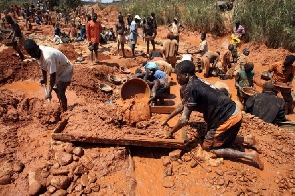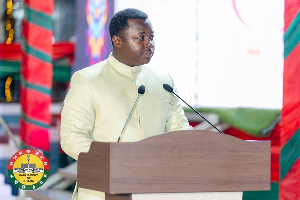“Government has lost the fight against galamsey – Mining consultant
“A mining consultant has said that the Government is only pretending to fight illicit small scale mining (galamsey) in the country. According to [this mining consultant] the measures against this particular trade has (sic) been heavily politicised by the Government, a situation that defeats the move.” UNQUOTE
I scratch my head as I ask: what is a “mining consultant”?
What qualifies him as a “mining consultant?”
Better still, since qualifications can be bought or be self-awarded, who was it that designated him a “mining consultant”?
Was he paid to make this statement?
If so, by whom?
In the days when I was a Reporter in the News Division of the Gold Coast Broadcasting Service (early 1957) if you brought such a story for inclusion in a news bulletin, one of the editors on duty – such as my fondly-remembered “DA” (Dan Kwadwo Awere); “OA” (Osei Acheampong); “DS” (Danquah-Smith”); “BLS” (Ben Sackey) – or if a Reporter was particularly unlucky, “KSS” (Kwatei Shang Simpson) – one would take one through an instant viva:
“What is a mining consultant?…
“Who does he work for?
“Why should his views be of interest to the whole of the country?
“Even if his views are of interest, what’s the news value? Is there any relevant discussion of mines currently going on in the Legislative Assembly? Is any legislation on mining contemplated?”
If one’s answers did not convince one of these editors on duty, not only would the story be spiked, but if one was not unfortunate, one might not be entrusted with duties relating to news for a week or two!
These tough interrogations ensured that no-one could be influenced by anything other than the true news value of any item, before presenting it for inclusion in say, the 9 o’clock news.
Yes, there were active political parties anxious to pass their propaganda through the GBS.
Yes, there were profit-seeking businesses.
But everyone’s route to publicity was the advertisement. The GBS, having been set up for the Gold Coast Government by the BBC, looked on advertisements as a sort of pestilence that was intended to present untruth – or the half-truth – as accurate information to the public.
The only worse thing apart from misjudgement, was, to us, taking money in order to include an item in a news bulletin. If one was even suspected of doing that, not only would one be fired but one might be prosecuted for accepting a bribe!
The questions I’ve asked on the item in the opening paragraphs of this article show you what the public are up against in these Internet-dominated days. Who was it, who, calling himself a journalist, allowed this to pass as news:
“Speaking in an interview,… [the mining consultant] emphasized that the government has lost the fight against galamsey, given the way and manner it was done… He added: “Small-scale mining sector is a sector that can throw in more money if we plan our policy and programmes very well. In this sector, people use wash plant (sic). There can be a whole industry producing the wash plant, which will give quality jobs.” UNQUOTE
The Government has “lost the fight against galamsey”?
Okay, suppose that’s true, what can make it win the fight against galamsey? Is that not the logical question that should follow the statement that the fight “has been lost”?
Ah, maybe the answer lies in the use of the “wash plant”? Which galamseyers have never heard of, of course?
Ha, according to our mining consultant, “small-scale mining sector is a sector that can throw in more money if we plan our policy and programmes very well”.
What? Is it not “small-scale mining” – with a greedy eye on easy money – that created the galamsey problem?
Didn’t a past Government, with the altruistic motive of allowing local communities to benefit from their underground resources allow people to engage in small-scale mining?
Is our “mining consultant” aware that a four-day “multi-stakeholder ‘action dialogue’ on artisanal and small-scale mining “ was even held at Tarkwa, in the Western Region, in January 2016, to thrash out the issue of artisanal mining in Ghana?
Yet, in spite of this “dialogue” between stakeholders, has anything occurred to indicate that small-scale miners have desisted from continuing to pollute Ghana’s water-bodies? Or are Rivers like Ankobra, Tano, Offin, Densu, Birem and Oti, etc. still experiencing a continuing onslaught that increasingly reduces their ability to provide potable water to the communities that were settled on their banks in ancient times precisely because these water-bodies could sustain life in their catchment areas?
Was it not out of exasperation with the unwillingness of the small-scale miners to recognise the harm they wee doing – not only to present generations but to unborn generations of Ghanaians – that the NPP Government decided to ban small-scale mining in January 2017? Was the ban not lifted on 17 December 2018?
Is our “mining consultant aware that as of December 2018, 1350 miners had been vetted, and some 900 licences granted to small-scale mining companies, by the Environmental Protection Agency, the Minerals Commission and the Water Resource Commission?
Does he not know that under Ghana’s new regulations, “all mining companies are obliged to have at least one employee trained in sustainable mining at the University of Mines and Technology?”
It is quite true that the IMPLEMENTATION of some of these proposals has encountered very difficult problems. For instance, Operation Vanguard, whose members were supposed to enforce the new regulations, has been weakened by the willingness of Ghanaian society to use and accept bribes to obtain the short-sighted and self-defeating advantage.
The perennial question of “Who guards the guards” has arisen often, as reports circulate of Operation Vanguard personnel being in cahoots with galamsey operators. In particular, the seizure of mining equipment, especially excavators, by Operation Vanguard personnel, has led to a sceptical attitude being developed by members of the public, with regard to the effectiveness of Operation Vanguard as a whole.
But human failures of this nature can beset the implementation of any governmental enterprise. It is up to Ghanaian society as a whole to realise the full cost of such frailties and work in tandem with the Government to try to solve them. The difficulty is, of course, compounded by the fact that members of the Government live with, and are part of, Ghanaian society and all its well-known foibles.
We cannot ignore these truths and adopt a mantra that simplistically proclaims “the fight is lost”. Neither can we pretend that the very reason why the struggle against galamsey was launched in the first place, is the only way to defeat galamsey.
Galamseyers do drink water, use water to cook and wash with, and yet willfully close their eyes to the destruction of water-bodies by chan-fangs, excavators and chemicals such as mercury.
Only a psychological awakening to these dangers by our entire population can create enough society-wide revulsion against galamsey and safeguard our heritage of water-bodies and fertile lands.
But obviously, many of our “experts” (certificated or not!) haven’t heard of the efficacy of a national awakening.
Opinions of Thursday, 3 December 2020
Columnist: Cameron Duodu
Ghanaian Times: A ‘mining consultant’? Who the hell is that?
Entertainment














